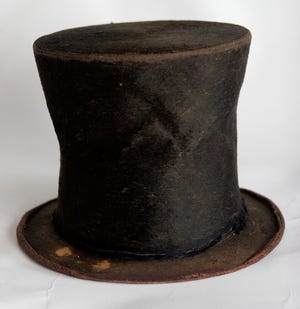Fighting by Lincoln Library and Museum, foundation angers lawmakers

When officials from Springfield’s Abraham Lincoln Presidential Library and Museum and its independent fundraising arm traded accusations and insults last week about their inability to play nice, state lawmakers were not pleased.
“This is childish bickering back and forth,” Rep. Kathleen Willis, D-Addison, told them during an online meeting of the Illinois House Tourism Committee after testimony from leaders of the ALPLM and Abraham Lincoln Presidential Library Foundation.
“The success of the Abraham Lincoln Library and Museum is paramount to what I think we need to do in the state of Illinois,” Willis said. “Both sides need to get together and work it out.”
Rep. Ann Williams, D-Chicago, who sponsored a bill signed into law by Gov. JB Pritzker almost two years ago to promote more cooperation between the two groups, said she was dismayed by the continuation of what she termed “mud-slinging” and “a toxic environment.”
Lawmakers said they want the two to cooperate to promote what Williams called “this amazing jewel” for Illinois — a state-supported library used by scholars around the world, and a world-class presidential museum, a major tourism attraction in the 16th president’s hometown, that opened in 2005 and welcomed its 5 millionth visitor last summer.
But since Thursday’s contentious committee meeting and the March 31 expiration of a “memo of understanding” between the foundation and the ALPLM — a deadline set by the ALPLM — the sides seemed no more likely to resolve their differences.
ALPLM officials refuse mediation offer
Both groups were criticized by lawmakers who implored them to take part in mediation. The non-binding, voluntary process would involve a neutral observer shuttling between them to promote a compromise as the ALPLM, a $13.8 million-a-year wing of state government, moves forward during a COVID-19 pandemic that has caused revenues to drop by 73%.
Officials from the ALPLM, who will celebrate the organization’s 16th anniversary on Monday with a ceremony at 11 a.m. outside the downtown museum building, said they will not take part in mediation with the foundation, at least not now, because it would be a waste of time.
Officials from the not-for-profit foundation said the foundation publicly called for mediation April 1, before anyone else requested it. The foundation’s new chief executive officer, Erin Carlson Mast, repeated to the committee that the foundation board remains willing to go through mediation without any preconditions.
Rep. Terra Costa Howard, D-Glen Ellyn, said she was “troubled” and “angry” that ALPLM won’t agree to mediation. “This issue does not belong in the Illinois House,” she said.
Earlier:Prosecutors: Ray LaHood pays $40,000 fine to resolve federal investigation
ALPLM chief legal counsel Dave Kelm said the library and museum would be interested in mediation only if the General Assembly passed legislation undoing the connection between the ALPLM and the foundation.
Kelm didn’t explain his statement, but ALPLM spokesman Chris Wills said later: “So long as the law says the ALPLM and foundation must work together, the foundation has no incentive to negotiate. If the ALPLM had more freedom to say ‘no’ to unfair proposals, the foundation would have to negotiate in good faith.”
Mast said the foundation, which raises money for the ALPLM and is responsible for the museum store, café and catering at the site, always has dealt with the ALPLM in good faith. She disagreed with the ALPLM’s characterization of talks regarding a new agreement on a working relationship.
Wills said the ALPLM “tried and tried and tried to get the foundation to negotiate under the current structure, but it ignored or dismissed all our overtures, so we have no reason to believe mediation would be productive without some change.”
He noted that state legislation that established ALPLM as a state agency in 2017 under the executive branch rather than part of another agency required ALPLM and the foundation to “mutually cooperate to maximize resources.”
Williams’ 2019 legislation required a memorandum of understanding between the two groups. Before the latest agreement expired, it hadn’t changed substantially since the organization’s inception, according to testimony during the committee meeting from Melissa Coultas, ALPLM acting executive director.
Wills said ALPLM is looking at options for continuing without the foundation, “including running a membership program ourselves and setting up a new foundation. Nothing has been decided.”
Mast, who has 20 years of experience in public and nonprofit museums, disputed statements by ALPLM officials about the negotiations. And the foundation issued a “Myths vs. Facts” document refuting ALPLM’s side of the dispute in detail.
Mast said ALPLM has pursued a “take it or leave it” approach to forging a new memorandum of understanding. Coultas called Mast’s assessment “embellishment at best,” and said the ALPLM’s “patience with the foundation’s delay tactics is over.”
Jason Lantzer, a historian at Butler University in Indianapolis who studies presidential libraries and museums, said it’s not unusual for those entities and their fundraising foundations to disagree over priorities and practices.
Unlike the ALPLM, which is run and heavily funded by the state of Illinois, most of the nation’s 15 presidential libraries and museums receive little state funding and are operated by the National Archives, an independent federal agency.
Regardless, Lantzer said, “It’s not atypical to have heads being butted.”
Misconduct, a hat and a power struggle
Rep. Tim Butler, R-Springfield, said it’s unclear exactly why the animosity and mistrust between the ALPLM and foundation developed. The foundation was formed in 2001 to build support for a library and museum that took $115 million to construct, mostly with federal and state funding.
“There was an aggregation of issues,” he said. “We’ve had issues since the place opened the door. There were transparency issues on both sides.”
Foundation officials said the tension seemed to get worse in 2012, when doubts were raised about the authenticity of a stovepipe hat purportedly owned at one time by Abraham Lincoln and valued at $6.5 million. It was part of the foundation’s $25 million purchase of Lincoln artifacts from collector Louise Taper in 2007.
Former State Historian Samuel Wheeler, in a 54-page report in December 2019 updating the progress of research to clarify the hat’s history, wrote that there was no “final determination” of whether Lincoln ever owned it. He said research into the hat’s history isn’t complete and should continue.
In the report, Wheeler expressed several concerns about the lack of research done by the ALPLM before the hat was acquired. He said publicity surrounding the situation damaged the reputation of the ALPLM and foundation.
Wheeler also called for an end to the “weaponization” of the hat by ALPLM officials against the foundation “as part of a power struggle dating back to 2012.”
Wheeler was fired in July 2020 for unspecified “performance” issues, though his lawyer said Wheeler never was informed of any specific shortcomings.
Wheeler’s dismissal followed other controversies at the library and museum, including Pritzker’s firing of former ALPLM Director Alan Lowe in September 2019 after Lowe improperly loaned a copy of Lincoln’s Gettysburg Address to a museum in Texas operated by conservative commentator Glenn Beck.

And ALPLM board chairman Ray LaHood of Peoria, a former congressman and U.S. transportation secretary, resigned from the board this month after it was disclosed that he paid a $40,000 fine to resolve a federal criminal investigation into his conduct. Authorities said LaHood admitted to making misleading statements to federal agents and failed to disclose a $50,000 loan on two government ethics forms.
More:Ray LaHood resigns as chair of the Lincoln presidential library and museum board
As for the stovepipe hat, it remains in the 1,400-piece Taper collection at the museum but isn’t on display, Wills said.
The foundation, which tried unsuccessfully to get the state to help pay down debt associated with the acquisition, says it has raised more $24 million toward payment of the loan’s principal, interest and insurance coverage, with more than $8 million in loan principal remaining.
Coultas, the ALPLM acting executive director, told lawmakers last week that the organization has made “great strides over the past year and a half to create the keystones of stability and success.” The ALPLM’s new executive director, Christina Shutt, will begin her duties in July, Coultas said.
But Coultas said the foundation has a “parasitic” relationship with the ALPLM, adding that the ALPLM has “faced delay or outright rejection from the foundation when we’ve requested simple information on fundraising efforts and basic finances that purport to support the ALPLM. … I have never experienced anything close to this level of stonewalling and hostility.”
When comparing the foundation’s reported income to what ALPLM receives, Coultas said “the amount is just over 7 cents on every dollar — a mere 7%.”
“We concede some foundation spending, such as payment on its Taper Collection debt, indirectly benefits the ALPLM. But the details on that are hazy — and other spending is a complete mystery to us,” Coultas said.
On the other side, foundation CEO Mast said the ALPLM has issued “misleading narratives that aren’t supported by the facts.” She said the foundation has raised $42 million to benefit the ALPLM since the site’s inception, with half going toward paying for the Taper Collection.
And in the past year, about 70 cents out of every dollar raised or earned by the foundation — not 7 cents — was “put toward AL
PLM expenses,” Mast said. She added that the foundation has “robust practices” to promote financial accountability as a nonprofit and posts financial documents that it files with the IRS on its website.
“The average total support per year since the ALPLM opened to the public has been $2.8 million,” Mast said. “That’s nearly $3 million a year the taxpayers of Illinois haven’t had to pay to support the ALPLM.”
She added, “Part of the problem appears to be the ALPLM’s misunderstanding that the foundation was created to simply hand over cash to the state whenever and for whatever it demands. That’s simply not how it works in nonprofit fundraising. Donors require us to be good stewards of their support.”
Also:Read the committee testimony from ALPLM acting executive director
Lawmakers criticized ALPLM officials for not complying with the intent of the 2019 legislation and not designating three members of its board to serve on a “working group” to “advance the interests of the agency.” This group, Willis said, could help reduce friction between the organizations.
Mast said the foundation board designated three people to serve on the working group immediately after passage of the 2019 bill.
Brett Cox, ALPLM’s chief fiscal officer, said the legislation called for the working group to be created through a memorandum of understanding and the foundation didn’t push for a working group in talks that failed to finalize an agreement on a new memorandum.
Wills added that LaHood, when he chaired the ALPLM board, believed a working group was “cumbersome and unnecessary” because he and the foundation board chairman spoke regularly. Wills noted that there already was a joint ALPLM/foundation committee looking into the history of the stovepipe hat.
“Finding the best way to meet that state mandate could have been part of discussions with the foundation if they had ever agreed to talk with us,” Wills said.
Mast said the foundation hasn’t added Democratic and Republican lawmakers from the Illinois House and Senate as ex-officio members of the foundation board, despite a previous request by lawmakers, because the foundation’s bylaws haven’t been changed yet to allow the additions.
Clinging to hope
Mast told The State Journal-Register that the foundation remains hopeful for a resolution through an agreement “that would respect the mutual identities of the organizations. Our focus is on the partnership.”
Butler said he hopes the current impasse between the groups lead to discussions with Pritzker’s office to create a “different model” for operating the ALPLM and its fundraising arm. Butler said he wants to see more harmony surrounding entities honoring Springfield’s most famous resident.
“This is Abraham Lincoln,” Butler said. He said the ALPLM is a “wonderful institution. People want to come here from around the world.”
Butler said he will approach the Pritzker administration soon.
Pritzker spokeswoman Jordan Abudayyeh didn’t respond to a request for comment late last week.
Contact Dean Olsen: [email protected]; (217) 836-1068; twitter.com/DeanOlsenSJR.
Read this:Read the committee testimony from Abraham Lincoln Presidential Library Foundation CEO





